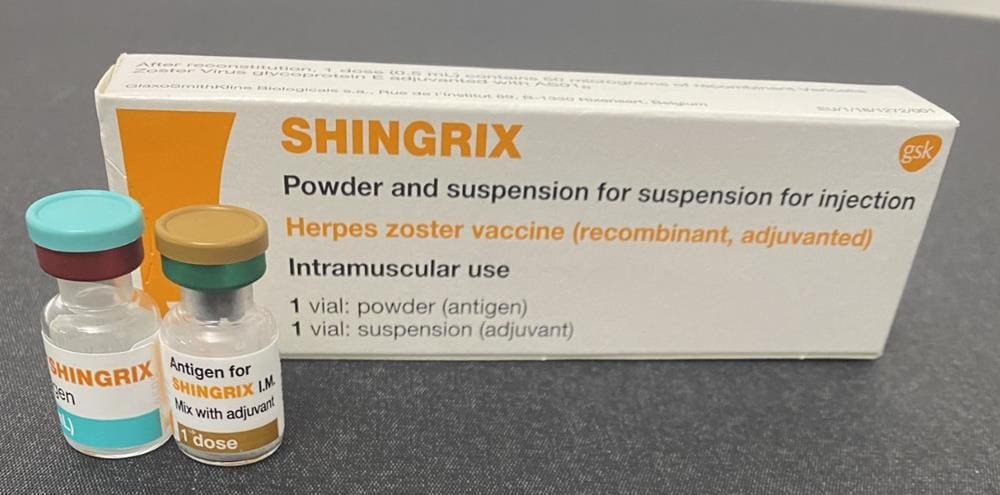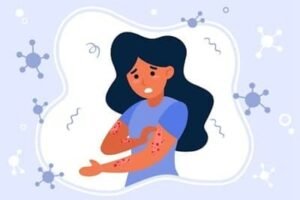
As the saying goes, prevention is better than cure, and the Shingrix vaccine is an effective, method to prevent shingles.
Shingles is one of the most common skin diseases, and those who have it experience excruciating pain and suffering.
But what causes this disease, what are the symptoms, and how effective is the Shingrix vaccine in preventing it?
This is what we’ll go over in-depth in this article, so please stay tuned!
What is the Shingrix vaccine?
It is one of two vaccines currently used to prevent shingles, and its complications, such as postherpetic neuralgia.
It is also known as the shingles or recombinant zoster vaccine (RZV).
How does the Shingrix vaccine work?
The vaccine contains a protein part of the varicella-zoster virus (VZV), which stimulates the body to produce and store antibodies to the virus until needed.
When the virus infects the body or is activated after a previous infection, the antibody-producing cells ( plasma cells) start releasing the virus-specific antibodies and quickly attack the virus and fight the disease.
What is herpes zoster?
It is a viral infection which causes a painful rash that appears on one side of the face or body, most often on the torso.
The disease has several names, such as:
- Herpes zoster.
- Shingles.
- Belt of fire.
The rash appears as blisters, which begin to fade within 7 to 10 days and disappear completely after about two weeks to a month.
Causes of herpes zoster
The disease is caused by the varicella-zoster virus (VZV), the same virus that causes varicella (chickenpox).
The virus remains latent in the dorsal root ganglia after the illness has passed.
People who have had chickenpox before, often as children, can sometimes suffer from a sudden viral reactivation and develop herpes zoster, also known as shingles.
Until now, the cause of shingles or the cause of reactivation of the virus that causes it is unknown, but the chances of getting shingles increases with age as immunity gets weaker.
Symptoms of shingles
Before the onset of shingles, there are some symptoms, such as:
- Pain, numbness, and itching at the site of the injury.
- The appearance of a red rash.
- Tenderness.
- Eventually, fluid-filled blisters appear, which then begin to open and crust.
Some people have other symptoms, such as:
- Fever and chills.
- Headache.
- Stomach disorders.
Is shingles contagious?
The possibility of transmission in case of infection is low.
It occurs due to direct contact with the fluids inside the blisters on the skin.
If someone infects others who have never had chickenpox or had the vaccine for it, they are more likely to get chickenpox than to get shingles.
Therefore, the best way to prevent infection is to cover the infection site and avoid contact with the infected person.
People most at risk of infection are:
- People with weak immunity.
- Newborns.
- Pregnant women.
Shingles complications
Among the most common complications of shingles infection are:
Postherpetic neuralgia
In some cases, pain may persist after recovery.
It is caused by the damaged nerve fibers sending conflicting, intense pain messages from the skin to the brain.
Vision loss
When infection occurs in the eye, herpes may cause painful eye infections, which leads to vision loss.
Skin infections
It occurs as a result of untreated herpes blisters.
Rare shingles complications
Some rare symptoms may occur in some people, such as:
- Pneumonia.
- Hearing problems.
- Encephalitis.
- Death.
Foods to avoid during shingles attack
It is preferable to avoid foods that weaken immunity, such as:
- Carbohydrates rich in sugar, for example:
- Sweets.
- Sugary drinks
- White bread.
- White Rice.
- Ice cream.
- Sugary sauces.
- Prepared foods and drinks, such as:
- Sugary energy drinks or soda.
- Fried food.
- Pies and pastries.
- Alcoholic beverages.
Who is a candidate for the Shingrix vaccine?
People 50 years of age and older are most in need of the Shingrix vaccine to prevent shingles.
It is also preferable to receive the vaccine even in the following cases:
- People who have had shingles or who have received the Zostavax vaccine.
- People who have previously received the chickenpox vaccination.
Shingrix vaccine doses
The CDC recommends receiving two doses of the vaccine two to six months apart.
Shingrix vaccine should be administered intramuscularly in the upper arm’s deltoid region.
The vaccine protects against shingles and its complications.
Receiving two doses of the vaccine provides up to 90% protection against disease, and it continues to give 85% protection during the first five years after receiving the vaccine.
Reasons for taking the shingrix vaccine
Anyone can get shingles, especially those who’ve had chickenpox.
However, some shingles risk factors increase the chances of contracting the disease and require vaccination, such as:
- Age of 50 years and over: the chances of infection increase with aging.
- Certain illnesses, that weaken immunity, such as AIDS or cancer.
- Medications that prevent the rejection of transplanted organs.
- Taking some medicines for long periods, such as steroids.
- Undergoing cancer treatments, such as chemotherapy or radiation.
Shingrix vaccine side effects
The Shingrix vaccine is safe, but may have some side effects, such as:
- Injection site redness, pain, or swelling.
- Headache, fever, and chills.
- Stomach pain or nausea.
- Muscle pain or fatigue.
Symptoms often go away within two to three days.
Taking medications, such as ibuprofen or acetaminophen, can help overcome these symptoms.
Shingrix vaccine contraindications
Contraindications to receiving the vaccine include:
- An allergy to any of the vaccine’s components.
- Current infection with shingles.
- Pregnancy and lactation cases.
- Severely ill patients.
Finally, the Shingrix vaccine prevents shingles effectively, which is one of the most painful skin diseases.
Therefore, we recommend taking the vaccine to maintain the body’s immunity because it is our first line of defense against many diseases.
